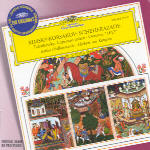Herbert von Karajan has some very interesting ideas about tempo in Scheherazade. He begins with a broadly paced introduction, but after Michel Schwalbé’s languorous violin solo he leaps into the allegro at a much faster pace, as if Sinbad were racing for the World Cup. Then, inexplicably, Karajan drops the sails and slows to a crawl for the meditative second subject–totally uncharacteristic for a conductor who was fabled to value tempo above all else. The Berlin Philharmonic does not keep a tight ship, suffering from slippery attacks and loose intonation; but it musters plenty of raw power, especially in the brass. Another curiosity is the way Karajan creates the impression of waves by luxuriating in a Mantovani-like string sound that occasionally veers into screechiness. The inner movements are relatively uneventful, but the finale finds Karajan back on his windjammer, heading inexorably toward the great crash at the climax, and all the while the percussion (oddly for him) takes centerstage.
Karajan’s Capriccio Italien is big, broad, and strangely Teutonic, while his 1812 Overture is notable for its use of a chorus in the opening hymn. But it’s a chorus from the Outer Limits. First we hear disembodied voices from some far off dimension, then only as they come closer do we recognize them as human. Or are they? The more fervently they sing, the more out of tune and unbalanced they become. Really scary! The remainder of the overture is well paced and exciting (with canned cannons), much more so than Claudio Abbado’s tranquilized reading on a recent Deutsche Grammophon release. Besides some noticeably increased clarity, DG’s recording is not much of an improvement over its last CD incarnation–meaning it still suffers from excessive brightness, congestion at the climaxes, and no bass.
































